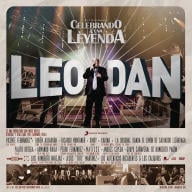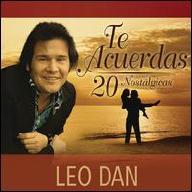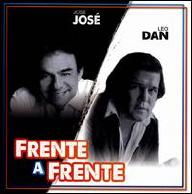Leo Dan was born Leopoldo Dante Tevez on March 22, 1942, into a wealthy family in the town of Atamisqui, in the Argentinian state of Santiago de Estero. At five he began to teach himself how to play flute and harmonica. At 16, he added guitar and piano to his repertoire and began composing his first songs; he refused to consider anything but music as a career. At 20 he pursued his dream to the capitol in Buenos Aires. He auditioned for CBS and signed a deal. The following month he released his first single, "Celia." It topped the chart a week after issue, and within a month went to the top in Spain as well. After the success of his self-titled debut album, Dan continued to crank out singles that would establish his career including "Fanny," "Cómo Te Extraño Mi Amor," "Estelita," "Libre Solterito y Sin Nadie," and "Santiago Querido" among them. In 1964 he won a spot on the Channel 9 variety program Sábados Continuados and became a fan favorite.
In 1966, he began hosting his own show entitled Bajo el Signo de Leo, (Under the Sign of Leo). He married that year, and soon after, emigrated to Spain. In 1968 he released the chart-topping album Quiero Que Me Beses Amor Mío, and starred in Enrique Cahen Salaberry's award-winning musical drama La Novela de un Joven Pobre (Story of a Poor Young Man) that established him as a major presence on Spain's entertainment scene.
In 1970, Dan emigrated to Mexico following his popular success there. He immediately issued two albums now considered immortal in the annals of Latin popular song: Te He Prometido, with its title single, and Con Los Brazos Cruzados, that included both "Mi Vida Sin Ti" and "Mari Es Mi Amor." Dan continued releasing charting pop-oriented and mariachi records throughout the decade. His biggest hit albums included 1971's Como Poder Saber Si Te Amo, 1973's Siempre Estoy Pensando en Ella, 1974's El Amor y la Felicidad, and 1979's compilation Lo Mejor de Leo Dan Ahora con Mariachi; each reached the upper rungs of the charts as Dan's concert tours sold out across the globe.
After a decade in Mexico and the release of 1979's number three Tengo Que Buscar a Lola, Dan returned to Argentina the following year. He enjoyed massive success with the multi-platinum Con Sabor Ranchero, El Radio Está Tocando Tu Canción and Linda. Dan took a five-year sabbatical from music and involved himself in politics, wrote a book, and made four self-financed films. He returned to recording and the charts with 1988's Más Que un Loco.
In 1990, he emigrated to Miami, Florida, in the United States. As ever, he documented the change with the album Soy de Cualquier Lugar (I'm from Anywhere). While albums such as Leo Rap proved a bridge too far for fans, his pop records -- including 1992's Como un Leon, and 1994's Después de Conocerte -- continued to chart as he toured across the Americas, Europe, Asia, and even Australia. In 1999 he issued the double-disc collection Mis 30 Mejores Canciones, featuring re-recordings of his best-known songs in a modern style. Fans and critics celebrated the release.
After issuing 2001's charting Amanecer, Dan focused on touring. His label responded with a steady stream of live albums and compilations including 2007's La Historia, which spent 17 weeks on the Latin Pop Albums chart and peaked at three (and landed inside the U.S. Top 200), and 2005's Serie Max, that reached number 17. 2007's Boleros offered both vintage and new love songs in collaboration with singers Pepe Bustos (La Sonora Santanera) and Jose Maria Napoleon.
In 2010, Sony remastered and re-issued Dan's complete catalog physically and digitally in handsome multi-album volumes. In 2015, the compilation Solo Para Mujeres peaked at number 11 at Latin Pop albums. In 2018, Dan issued the live Celebrando a Una Leyenda, a re-recording of his hits in concert with current popular artists influenced by him including Vicente Fernandez, Rio Roma, Natalia Jimenez, Edwin Luna, Trakalosa de Monterrey, Alicia Villareal, Beto Zapata, and others. It peaked on the Latin streaming charts at number five. In 2020, he followed with Celebrando a una Leyenda, Segunda Parte, a second volume from the concert. ~ Thom Jurek, Rovi


















